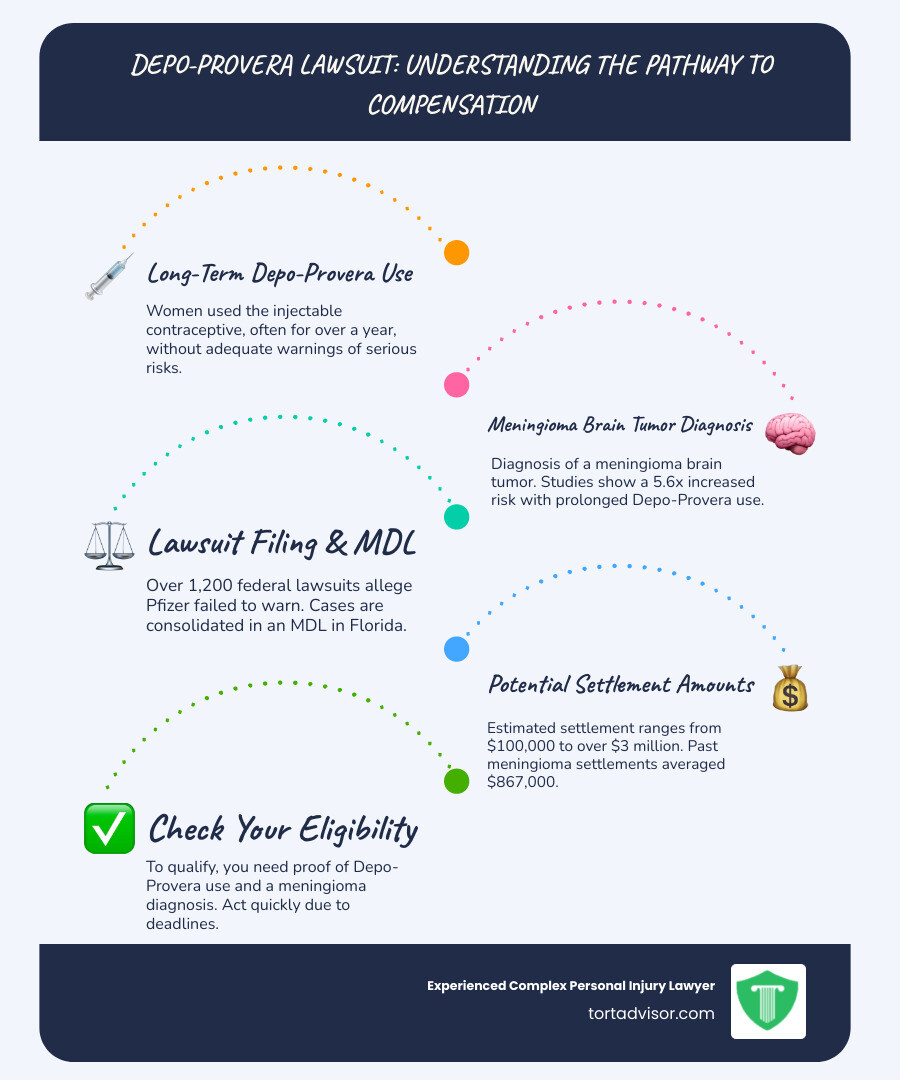


Women Diagnosed with Brain Tumors After Using This Common Birth Control Shot May Be Entitled to Compensation
Depo-Provera lawsuit settlements are being pursued by women who developed meningioma brain tumors after using the injectable contraceptive. While no final settlements have been reached, compensation is expected to range from $100,000 to over $3 million, depending on the severity of the injuries.
Key Facts About Depo-Provera Settlements:
- No Global Settlement Yet – Litigation is ongoing as of 2025
- Estimated Range – $100,000 to $3+ million per case
- Past Meningioma Verdicts – Averaged $3.4 million
- Past Meningioma Settlements – Averaged $867,000
- Over 1,200 Federal Cases Filed – Numbers growing rapidly
- MDL Established – Cases consolidated in Florida federal court
Lawsuits allege Pfizer failed to warn U.S. consumers that long-term Depo-Provera use increases the risk of meningioma brain tumors by more than 5 times. Studies show women who used the shot for over a year face significantly higher risks. While Pfizer added warnings in Canada and Europe, U.S. labels remained unchanged for years.
Your potential settlement amount depends on the grade of your tumor, the need for surgery, total medical expenses, lost wages, and the impact on your daily life. More severe cases requiring invasive brain surgery typically receive higher payouts.
Depo-Provera lawsuit settlements terms explained:
- Depo-Provera lawsuit eligibility
- Depo-Provera severe side effects
- depo provera lawsuit qualifications
The Link Between Depo-Provera and Meningioma Brain Tumors
Thousands of women are finding an alarming connection between the Depo-Provera birth control shot and serious brain tumors. Lawsuits against Pfizer allege the company failed to warn U.S. consumers about risks that were acknowledged in other countries years ago.
What is Depo-Provera and Why Are Lawsuits Being Filed?
Depo-Provera is an injectable contraceptive containing medroxyprogesterone acetate (MPA), a synthetic progestin. Given every three months, it’s a convenient long-term birth control option also used for endometriosis. However, the drug has a troubled history. After initial denials, the FDA approved it in 1992 but later required a black box warning—the most serious type—for significant bone density loss with long-term use.
The core of the Depo-Provera lawsuit settlements claims is allegations of negligence. Pfizer reportedly added warnings about meningioma brain tumors to Depo-Provera labels in Canada and Europe as early as 2016, yet U.S. consumers received no such warnings for years. This alleged failure to warn U.S. consumers about known risks is the basis of the litigation. For a comprehensive look at the problems associated with this medication, explore more on Depo-Provera side effects.
Scientific Evidence Highlighting the Risk
Meningiomas are tumors in the protective membranes around the brain and spinal cord. While typically benign (non-cancerous), their location makes them dangerous, as they can press on vital brain tissue. A landmark 2024 British Medical Journal (BMJ) study found that women using Depo-Provera for over a year had a 5.6x increased risk of developing meningiomas.
This finding was supported by a September 2025 JAMA Neurology study confirming the link. The biological mechanism is also concerning: research shows these tumors have progesterone receptors, meaning they can respond to the synthetic hormone in Depo-Provera, which could potentially fuel their growth. For more detailed information, read more on the link between Depo-Provera and brain tumors.
Recognizing Meningioma Symptoms and Treatment Options
Meningioma symptoms can develop slowly or appear suddenly. Key warning signs include:
- Debilitating headaches that don’t respond to pain relievers
- Vision problems, such as blurred or double vision
- Seizures, especially with no prior history
- Cognitive difficulties, like memory loss or confusion
- Hearing loss or ringing in the ears (tinnitus)
- Weakness, numbness, or balance problems
Diagnosis via MRI or CT scan confirms the tumor. Treatment options often involve a craniotomy (brain surgery) to remove the tumor, which is invasive and requires extensive recovery. For tumors in dangerous locations, radiation therapy may be the only option.
The financial burden is immense, with treatment costs sometimes exceeding $700,000. This is why Depo-Provera lawsuit settlements are crucial for women facing these expenses. You can learn more about meningioma symptoms and treatments from medical experts.
Understanding Potential Depo-Provera Lawsuit Settlements
Understanding how Depo-Provera lawsuit settlements work can clarify the path to financial compensation. A settlement is an agreement reached out of court, while a verdict is a decision made by a judge or jury after a trial. While the Depo-Provera litigation is ongoing, we can look at similar cases to estimate potential compensation.
How Much Are Depo-Provera Lawsuit Settlements Worth?
No global settlement for Depo-Provera cases exists yet, so there are no predetermined payouts. However, based on similar pharmaceutical litigation, legal experts estimate individual compensation could range from tens of thousands to over a million dollars.
An analysis of past meningioma lawsuits provides a useful benchmark: the average settlement was $867,555, and the average trial verdict was $3,409,650. These figures are not guarantees but offer a realistic view of compensation for such serious brain tumors. Pfizer has also settled Depo-Provera claims before, paying nearly $2 million in a Canadian class action over bone density loss, showing a willingness to resolve claims with compelling evidence. For a more detailed breakdown, see our Depo-Provera Settlement Amounts Lawsuit Guide.
Key Factors That Influence Payout Amounts
Your compensation is calculated based on the unique damages in your case. Key factors include:
- Severity of Injury: A high-grade tumor requiring invasive surgery will command more compensation than a small, slow-growing one.
- Duration of Depo-Provera Use: Longer use strengthens the link between the drug and your diagnosis, potentially increasing settlement value.
- Age at Diagnosis: A younger diagnosis means a longer period of potential suffering, medical monitoring, and career disruption, which is reflected in the compensation.
- Total Medical Expenses: All costs for surgery, radiation, medication, and ongoing care are included. Brain tumor treatment can exceed $700,000.
- Lost Wages: Compensation covers income lost due to treatment and recovery, as well as diminished future earning capacity if you cannot return to your previous work.
- Pain and Suffering: This non-economic damage accounts for the physical and emotional trauma of a brain tumor diagnosis and treatment.
- Need for Ongoing Care: Future costs for monitoring, therapy, or home assistance are factored into the settlement.
What Types of Damages Can Be Recovered?
A Depo-Provera lawsuit settlement claim seeks compensation for both economic and non-economic damages.
Economic damages cover tangible financial losses, including all medical bills, lost income, and loss of future earning capacity. It also includes related expenses like travel for treatment or home modifications.
Non-economic damages address intangible harms. This includes pain and suffering for physical agony and invasive treatments, emotional distress for the psychological trauma, and loss of quality of life for the inability to enjoy hobbies and daily activities. In some cases, a spouse may claim loss of consortium for the impact on the marital relationship.
An experienced attorney can document and value all these damages to fight for the maximum compensation you deserve. To get a personalized estimate, you can explore your potential compensation using our settlement calculator.
Current Status of the Depo-Provera Litigation
The Depo-Provera lawsuit settlement litigation is moving quickly, with thousands of women seeking justice. Understanding the current status can help you make informed decisions.
The Depo-Provera Multidistrict Litigation (MDL 3140)
The large number of lawsuits against Pfizer led to the creation of a Multidistrict Litigation (MDL). An MDL is different from a class action. While cases are grouped in one court for pretrial efficiency, each plaintiff maintains an individual lawsuit. This means your potential Depo-Provera lawsuit settlement will be based on your specific injuries and damages, not split among a large group.
The Depo-Provera MDL (MDL 3140) is centralized in the Northern District of Florida. As of October 2025, over 1,200 federal lawsuits have been consolidated into this MDL, with case numbers growing rapidly. Hundreds of additional lawsuits are also pending in state courts across the country, including in Delaware, New York, and California. For more details on the legal status, check out What’s the Legal Status of the Depo-Provera Lawsuits?.
Recent Lawsuit Updates and Key Milestones
The litigation began in October 2024 with the first lawsuit, and the federal MDL was officially established in February 2025. Currently, the parties are in the findy phase, exchanging documents and evidence to build their cases.
An important next step is the selection of bellwether trials. These are test cases that go to trial first, and their outcomes often shape settlement negotiations for the remaining thousands of cases. A large plaintiff verdict in a bellwether trial can motivate a defendant to offer more substantial global settlements.
Pfizer is mounting a vigorous defense, arguing that federal FDA regulations should preempt state-based failure-to-warn claims. However, plaintiffs’ attorneys counter that Pfizer successfully added meningioma warnings in Canada and Europe years ago, suggesting they could have done the same in the U.S. As the litigation progresses, bellwether trial dates will be set and settlement talks may begin. Stay up to date with the latest developments at Depo-Provera Lawsuit Updates 2025.
How to File a Depo-Provera Lawsuit
If you were diagnosed with a meningioma after using Depo-Provera, you may be wondering about your next steps. Taking legal action against a pharmaceutical giant like Pfizer is a significant undertaking, but the process is manageable with the right guidance.
Determining Your Eligibility for a Claim
To qualify for a lawsuit, you must establish a clear link between your Depo-Provera use and your diagnosis. Generally, you will need:
- Proof of brand-name Depo-Provera use for a significant period. Attorneys often look for use of over one year (four or more injections), as studies show the highest risk with long-term use.
- A diagnosis of a meningioma (brain or spinal cord tumor) that occurred after you started using Depo-Provera. Medical records documenting the diagnosis are essential.
Gathering your medical and pharmacy records early will help an attorney evaluate your case. For a comprehensive guide, see our complete guide to Depo-Provera Lawsuit Qualifications.
The Importance of the Statute of Limitations
You do not have unlimited time to file a lawsuit. Every state has a “statute of limitations,” a legal deadline for taking action. For a Depo-Provera lawsuit settlement, this deadline is typically two to three years from your meningioma diagnosis, depending on your state.
The clock may start ticking when you knew or should have known that Depo-Provera might have caused your tumor. Since the key scientific studies were published recently, many women are just now learning of this link. Acting quickly is crucial, as waiting too long could forfeit your right to compensation.
Key Steps in Pursuing a Depo-Provera Claim
The process follows a structured path with an experienced attorney:
- Free Case Evaluation: A qualified law firm will review your situation at no cost or obligation to determine if you have a viable claim.
- Hiring an Experienced Lawyer: The attorneys we connect you with work on a contingency-fee basis, meaning you pay nothing unless they win compensation for you.
- Gathering Evidence: Your legal team collects all medical records, prescription histories, and expert testimony to build a strong case.
- Filing the Complaint: Your attorney files the lawsuit against Pfizer, which will likely be transferred to the MDL in Florida.
- Findy and Negotiations: During the findy phase, both sides exchange information. Afterward, your attorney will enter settlement negotiations to fight for fair compensation. If a fair settlement isn’t reached, the case may proceed to trial.
Frequently Asked Questions about Depo-Provera Lawsuit Settlements
It’s natural to have questions when considering legal action for a meningioma diagnosis. Here are answers to some of the most common questions we hear.
How much is a Depo-Provera case worth?
Payouts are not guaranteed and vary based on individual circumstances. However, based on past meningioma lawsuits, settlements have averaged over $800,000, with some trial verdicts exceeding $3 million. The value of your case will depend on factors like the severity of your tumor, your medical costs, and the overall impact on your life.
Is there a class action lawsuit for Depo-Provera?
No, the cases are part of a Multidistrict Litigation (MDL), not a class action. This is beneficial for plaintiffs, as an MDL allows you to maintain an individual lawsuit. Any settlement or verdict you receive is based on your unique damages, rather than being a small portion of a larger group payout.
How long will it take to get a Depo-Provera settlement?
The timeline is uncertain because mass tort litigation is complex and can take several years. The Depo-Provera MDL is still in its early stages, with findy and bellwether trial selection underway. The outcomes of these initial trials will heavily influence future settlement negotiations. An experienced attorney will work to resolve your claim as efficiently as possible, but it is important to file your claim promptly to get into the system.
How an Experienced Attorney Can Help Your Claim
Facing a meningioma diagnosis is difficult enough without having to steer a complex lawsuit against a pharmaceutical giant like Pfizer. An experienced attorney is essential for handling a Depo-Provera lawsuit settlement claim.
These cases involve intricate scientific evidence, the specific rules of the federal MDL system, and defendants with vast legal resources. An attorney specializing in dangerous drug litigation understands how to build a compelling case, gather the necessary medical evidence, and meet all strict legal deadlines.
Most importantly, they handle every aspect of your case so you can focus on your health. They will fight to maximize your compensation, accounting for all medical expenses, lost wages, and the profound impact on your quality of life. Tort Advisor connects people harmed by dangerous products with highly skilled attorneys who have proven track records in pharmaceutical litigation.
If you or a loved one developed a meningioma after using Depo-Provera, time is of the essence. The statute of limitations is running. Don’t wait to explore your legal options. Learn more about filing a Depo-Provera Lawsuit and get a free case evaluation today. The consultation is free, and you only pay attorney fees if your case is successful.
Free Confidential Case Evaluation
Complete the short form below to get an immediate FREE case review with an expert in your specific claim. Don't wait, your case could be time sensitive to file a claim.
Related Posts
Discover New Jersey disability benefits: TDI, FLI, SSDI, SSI rates, eligibility, applications & appeals for 2025-2026.
Hire a Depo-Provera lawsuit attorney now. Fight Pfizer for meningioma risks from injections. Free consult, MDL updates & settlements up to $1.5M.
Find top Miami florida car accident lawyers after your 305 crash. Get max compensation, navigate no-fault laws & choose the best experts now!
Diagnosed with cancer after Roundup? Learn about the monsanto roundup lawsuits, eligibility criteria, and how to pursue your claim.
Discover how do you qualify for a hair relaxer lawsuit: criteria, diagnoses, evidence & brands in uterine cancer MDL. Claim review now!
Find the best uber sexual assault lawsuit lawyer: expert guides, MDL experience, proven results & nationwide firms for justice.










